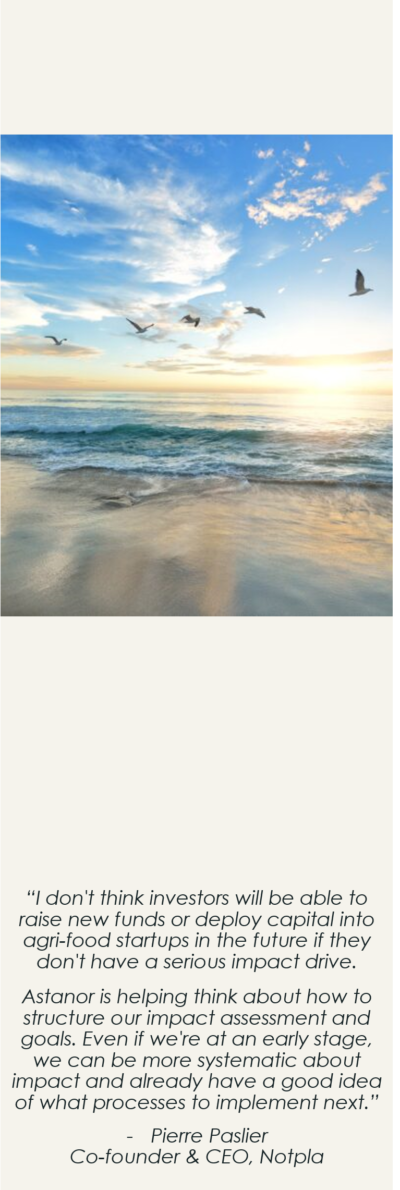Beyond Carbon: celebrating Earth Day from an impact investor perspective
Astanor celebrates Earth Day 2021

This Earth Day 2021 comes at a striking time in human existence.
The past year has been marked by a global pandemic that claimed upwards of 3 million lives and shined a magnifying glass on the vulnerabilities of our global health and economic systems.
Yet through this long year, as the shortcomings, inequalities and environmental repercussions of our current systems were exposed, the year 2020 marked a pivotal moment in sustainable investing, with €1.1 trillion allocated to sustainable funds in the Europe alone, a 52% increase in a single year.
We can applaud this moment in time, the time that investors began to see the fragility of a system that turns a blind eye to the externalities caused by a monolithic definition of corporate profit.
Optimizing a single variable
The year 2020 sparked a collective understanding of the simple fact we cannot track the health of the system by looking at only a few variables. Today, extreme caution must be taken to avoid reproducing this same error in the name of climate change.
Carbon, the building block of life and the culprit of climate change, rules the stage in sustainability and investing in recent days. While it has rightfully earned its place in the spotlight, we cannot let ourselves be blinded by the seemingly simple solution of optimizing for a single variable. Investors play a crucial role in the development of a sustainable economy and thus must take a wholistic look at the impacts of their investments.
While carbon may be the basis for all living things, truly thriving, vibrant, vivid life comes from the equilibrium between carbon levels, water quality, and the health of soil and seabeds. As an impact investor, we embrace our responsibility to balance these elements, to search for entrepreneurs with disruptive ideas that promise to deliver impact at scale to build a truly sustainable system.



Impact investing in the agrifood system
The global agrifood system provides a unique example of the need for a balanced approach between sustainability concerns.
The result of a millennia of development, today’s agrifood system has optimized for producing large quantities of cheap calories while becoming a leading source of greenhouse gas emissions and a catalyst for water scarcity and biodiversity loss at a global scale. The rise in social inequalities and health crises reflect in part the health of the very system that grows, produces, distributes and commercializes our food.
As an impact investor, we embrace our role to reinvent a broken food system, measuring impact across 6 key categories, each an essential pillar in the foundation of a sustainable food system: greenhouse gas reduction, water footprint, land and ocean biodiversity, health, social and data.
Greenhouse Gas Emissions
The food and agriculture industry is one of the largest single causes of climate change, contributing 34% of global emissions annually. GHG emissions avoided or sequestered is a common trait among Astanor’s investees and is translated into one single metric – tons of CO2 emissions avoided.
Water Use
With increases in drought and a growing understanding of the fragility of water resources, we search for solutions that reduce water use across the food system, especially within water stressed regions, reducing the water footprint and ensuring food security in a water-scarce world.
Biodiversity – Land & Ocean
From the way food is produced and harvested to distributed and discarded, the food system is a constant threat to biodiversity both on land and in the deepest reaches of the ocean. Maintaining these ecosystems is essential to climate change mitigation efforts and to supporting the balance of life on earth.
Health
A focus on quantity of cheap calories over quality and nutrition has resulted in widespread food-related health issues that are crippling healthcare systems globally. We support entrepreneurs who connect consumers to fresh, local and healthy food and accelerate the availability of nutritious, affordable food.
Social
Fair remuneration to farmers as well as education and access of quality nutritious food for all individuals are cornerstones of a sustainable food system. Astanor searches for solutions that support better remuneration and access to capital for producers and actively work to alleviate social inequalities.
Climate-Tech Data
Enablers are necessary to ensuring our collective advancement towards global climate goals. Today, we have one “enabler” KPI, Climate Tech Data, and may add more as our methodology evolves.


Scaling impact
It is only through this balanced view of impact that we can achieve sustainability and start regenerating the exhausted ecosystems around us. A keen understanding of the systems that surround us and will allow investors and entrepreneurs, creatives and academics to bring to life the systemic, disruptive changes needed to restore health to our planet and ecosystems.
The food system is but one example of the many human systems that has reached a tipping point, where evolutionary, iterative changes to the existing system will not suffice. There is a role to be played by impact investors are across industries and across the globe, and with the right set of tools, there need be no trade-off between return and impact.
